Justice for Bahai Political Prisoners
Since 2005, in Iran, at least nine Baha’is have been murdered or died under suspicious circumstances, more than 710 Iranian Baha’is have been arrested. Most of the arrests and detentions follow a similar pattern: Agents of the Ministry of Intelligence arrive at the homes of Baha’is, search the premises, confiscate items such as computers and books, and then make arrests. Since 2005 In April 2014, it was learned that elements of Iran’s Revolutionary Guards had begun destruction of a historic Baha’i cemetery in Shiraz, apparently to make way for a new sports and cultural centre. Economic pressure on Iran’s Baha’i community is acute, with both jobs and business licenses being denied to Baha’is. Government jobs, including not only in the civil service but also in such fields as education and law, have been denied to Baha’is since the years immediately following the Revolution and Muslims often are pressured to fire Baha’is in their employment in the private sector. Baha’i school children at all levels continue to be monitored and slandered by administrators and teachers in schools. Over the years, thousands of pieces of anti-Baha’i propaganda have been disseminated in official or semi-official Iranian media.
Source
Seven Leaders
In 2008, seven Bahai leaders, members of a national-level coordinating group known as the “Friends in Iran”, were arrested for allegedly “disturbing national security,” “spreading propaganda against the regime,” and “engaging in espionage for Israel.” Their arrests in 2008 and sentencing in 2010 provoked an international outcry and are the longest sentences of any current prisoners of conscience in Iran.
Mrs. Fariba Kamalabadi
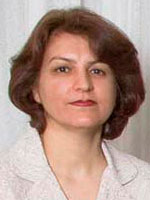 Fariba Kamalabadi, 50, is a developmental psychologist and mother of three who was arrested twice previously because of her involvement with the Baha’i community. On one of those occasions she was held incommunicado for 10 days. Her father, a physician, was imprisoned and tortured in the 1980s because of his faith. As a Baha’i youth, Mrs. Kamalabadi was denied the opportunity to study at a public university. In her mid-30s, she embarked on an eight-year period of study and ultimately received an advanced degree from the Baha’i Institute of Higher Education, an alternative institution established by the Baha’i community of Iran to serve young people who were barred from university. Mrs. Kamalabadi is married to Ruhollah Taefi. The youngest of their children is only 16 years old.
Fariba Kamalabadi, 50, is a developmental psychologist and mother of three who was arrested twice previously because of her involvement with the Baha’i community. On one of those occasions she was held incommunicado for 10 days. Her father, a physician, was imprisoned and tortured in the 1980s because of his faith. As a Baha’i youth, Mrs. Kamalabadi was denied the opportunity to study at a public university. In her mid-30s, she embarked on an eight-year period of study and ultimately received an advanced degree from the Baha’i Institute of Higher Education, an alternative institution established by the Baha’i community of Iran to serve young people who were barred from university. Mrs. Kamalabadi is married to Ruhollah Taefi. The youngest of their children is only 16 years old.
Prisons: Evin 14-05-08; Rajaieshahr 9-Aug-10; Qarchak Prison Evin 18-May-11; Currently: Tehran (Evin)
Mr. Jamaloddin Khanjani
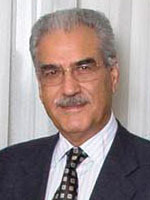 Jamaloddin Khanjani, 80, was a successful factory owner who, because he was Baha’i, lost his business after the 1979 Islamic revolution. His brick-making factory – the first automated such facility in Iran – employed several hundred people until forced to close in the early 1980s. Mr. Khanjani’s volunteer service to his religious community included membership on the National Spiritual Assembly of the Baha’is of Iran in 1984, a year that saw four of the nine members executed by the government. Later, he was able to establish a mechanized farm on properties owned by his family. But authorities placed many restrictions on him and made it difficult to operate. The restrictions extended to his children and relatives and included refusing loans, closing their places of business, limiting business dealings, and banning travel outside Iran. Mr. Khanjani was arrested and imprisoned at least three times before this most recent incarceration in 2008. He has four children and six grandchildren. His wife, Ashraf Sobhani, passed away on 10 March 2010, while Mr. Khanjani was still in prison.
Jamaloddin Khanjani, 80, was a successful factory owner who, because he was Baha’i, lost his business after the 1979 Islamic revolution. His brick-making factory – the first automated such facility in Iran – employed several hundred people until forced to close in the early 1980s. Mr. Khanjani’s volunteer service to his religious community included membership on the National Spiritual Assembly of the Baha’is of Iran in 1984, a year that saw four of the nine members executed by the government. Later, he was able to establish a mechanized farm on properties owned by his family. But authorities placed many restrictions on him and made it difficult to operate. The restrictions extended to his children and relatives and included refusing loans, closing their places of business, limiting business dealings, and banning travel outside Iran. Mr. Khanjani was arrested and imprisoned at least three times before this most recent incarceration in 2008. He has four children and six grandchildren. His wife, Ashraf Sobhani, passed away on 10 March 2010, while Mr. Khanjani was still in prison.
Prisons: Evin 14-05-08; Rajaieshahr 9-Aug-10
Mr. Afif Naeimi
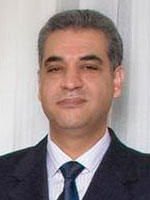 Afif Naeimi, 51, is an industrialist who was unable to pursue his dream of becoming a doctor because as a Baha’i he was denied access to university. He diverted his attention to business, one of the few avenues of work open to Baha’is, and eventually took over management of his father-in-law’s blanket and textile factory. Born in Yazd, he lived part of his youth with relatives in Jordan after the death of his father. He was long active in volunteer Baha’i service, teaching classes for both children and adults and serving as a member of the Auxiliary Board, an appointed position with the function of inspiring, encouraging, and promoting learning among Baha’is. He and his wife, Shohreh Khallokhi, have two grown sons.
Afif Naeimi, 51, is an industrialist who was unable to pursue his dream of becoming a doctor because as a Baha’i he was denied access to university. He diverted his attention to business, one of the few avenues of work open to Baha’is, and eventually took over management of his father-in-law’s blanket and textile factory. Born in Yazd, he lived part of his youth with relatives in Jordan after the death of his father. He was long active in volunteer Baha’i service, teaching classes for both children and adults and serving as a member of the Auxiliary Board, an appointed position with the function of inspiring, encouraging, and promoting learning among Baha’is. He and his wife, Shohreh Khallokhi, have two grown sons.
Prisons: Evin 14-05-08; Rajaieshahr 9-Aug-
Mr. Saeid Rezaie
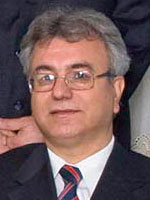 Saeid Rezaie, 54, is an agricultural engineer who has run a successful farming equipment business for more than 20 years. He is the author of several books and is known for his extensive scholarship on Baha’i topics. He was born in Abadan and spent his childhood in Shiraz, where he obtained a degree from Pahlavi University. During the early 1980s, when persecution of Baha’is was intense, he moved to northern Iran and worked as a farming manager, then to Kerman to work as a carpenter, in part because of the difficulties Baha’is faced in finding formal employment or operating businesses. In 1985, he and a friend were able to open an agricultural equipment company in Fars province, and the business prospered. Mr. Rezaie has actively served the Baha’i community since he was a young man, teaching children’s classes for many years and promoting other educational endeavors. He and his wife, Shaheen Rowhanian, have three children. Their two daughters, both in their 20s, were among a group of 54 young Baha’is arrested in Shiraz in 2006 while engaged in a project aimed at helping underprivileged young people. Their son is 13 years old. In 2006, before his latest incarceration in 2008, Mr. Rezaie was arrested and detained for a period that included 40 days in solitary confinement.
Saeid Rezaie, 54, is an agricultural engineer who has run a successful farming equipment business for more than 20 years. He is the author of several books and is known for his extensive scholarship on Baha’i topics. He was born in Abadan and spent his childhood in Shiraz, where he obtained a degree from Pahlavi University. During the early 1980s, when persecution of Baha’is was intense, he moved to northern Iran and worked as a farming manager, then to Kerman to work as a carpenter, in part because of the difficulties Baha’is faced in finding formal employment or operating businesses. In 1985, he and a friend were able to open an agricultural equipment company in Fars province, and the business prospered. Mr. Rezaie has actively served the Baha’i community since he was a young man, teaching children’s classes for many years and promoting other educational endeavors. He and his wife, Shaheen Rowhanian, have three children. Their two daughters, both in their 20s, were among a group of 54 young Baha’is arrested in Shiraz in 2006 while engaged in a project aimed at helping underprivileged young people. Their son is 13 years old. In 2006, before his latest incarceration in 2008, Mr. Rezaie was arrested and detained for a period that included 40 days in solitary confinement.
Prisons: Evin 14-05-08; Rajaieshahr 9-Aug-10
Mrs. Mahvash Sabet
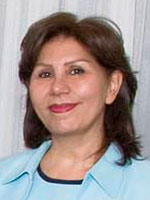 Mahvash Sabet, 60, is a teacher and school principal who was dismissed from public education for being a Baha’i. Before her arrest, she served for 15 years as director of the Baha’i Institute for Higher Education, which provides alternative higher education for Baha’i youth. She was born in 1953 in Ardestan and moved to Tehran when she was in fifth grade. Her bachelor’s degree is in psychology. She began her professional career as a teacher and also worked as a principal at several schools. In her professional role, she also collaborated with the National Literacy Committee of Iran. After the Islamic revolution, like thousands of other Iranian Baha’i educators, she was fired from her job and blocked from working in public education. She and her husband, Siyvash Sabet, have two grown children.
Mahvash Sabet, 60, is a teacher and school principal who was dismissed from public education for being a Baha’i. Before her arrest, she served for 15 years as director of the Baha’i Institute for Higher Education, which provides alternative higher education for Baha’i youth. She was born in 1953 in Ardestan and moved to Tehran when she was in fifth grade. Her bachelor’s degree is in psychology. She began her professional career as a teacher and also worked as a principal at several schools. In her professional role, she also collaborated with the National Literacy Committee of Iran. After the Islamic revolution, like thousands of other Iranian Baha’i educators, she was fired from her job and blocked from working in public education. She and her husband, Siyvash Sabet, have two grown children.
Prisons: Mashhad; Evin–26 May 2008; Rajaieshahr 9-Aug-10; Qarchak Prison; Evin 18-May-11; Currently: Tehran (Evin)
Mr. Behrouz Tavakkoli
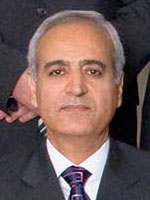 Behrouz Tavakkoli, 61, was a social worker who lost his government job in the early 1980s because of his Baha’i belief. Prior to his most recent imprisonment, he experienced intermittent detainment and harassment and, three years ago, was jailed for four months without charge, spending most of that time in solitary confinement and developing serious kidney and orthotic problems. He studied psychology in university and then completed two years of service in the army, where he was a lieutenant. He later took additional training and then specialized in the care of the physically and mentally handicapped, working in a government position until he was fired because of his religion. He and his wife, Tahereh Fakhri Tuski, have two sons, one of whom lives in Canada and another who has been studying architecture through the Baha’i Institute for Higher Education. Mr. Tavakkoli was elected to the local Baha’i governing council in Mashhad while a student at the university there and later served on a similar council in Sari before such institutions were banned in the early 1980s. He also served on various Baha’i youth committees, and during the early 1980s was appointed to the Auxiliary Board. To support his family after he lost his government position, Mr. Tavakkoli established a small millwork carpentry shop in the city of Gonbad. He also organized a series of classes in Baha’i studies for adults and young people.
Behrouz Tavakkoli, 61, was a social worker who lost his government job in the early 1980s because of his Baha’i belief. Prior to his most recent imprisonment, he experienced intermittent detainment and harassment and, three years ago, was jailed for four months without charge, spending most of that time in solitary confinement and developing serious kidney and orthotic problems. He studied psychology in university and then completed two years of service in the army, where he was a lieutenant. He later took additional training and then specialized in the care of the physically and mentally handicapped, working in a government position until he was fired because of his religion. He and his wife, Tahereh Fakhri Tuski, have two sons, one of whom lives in Canada and another who has been studying architecture through the Baha’i Institute for Higher Education. Mr. Tavakkoli was elected to the local Baha’i governing council in Mashhad while a student at the university there and later served on a similar council in Sari before such institutions were banned in the early 1980s. He also served on various Baha’i youth committees, and during the early 1980s was appointed to the Auxiliary Board. To support his family after he lost his government position, Mr. Tavakkoli established a small millwork carpentry shop in the city of Gonbad. He also organized a series of classes in Baha’i studies for adults and young people.
Prisons: Evin 14-May-08; Rajaieshahr 9-Aug-10
Mr. Vahid Tizfahm
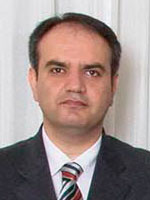 Vahid Tizfahm, 40, is an optometrist and owner of an optical shop in Tabriz, where he lived until early 2008 when he moved to Tehran. He was born and spent his youth in the city of Urumiyyih and went to Tabriz at age 18 to study to become an optician. He later also studied sociology at the Advanced Baha’i Studies Institute, an affiliate of the Baha’i Institute for Higher Education. Mr. Tizfahm and his wife, Furuzandeh Nikumanesh, have an 11-year-old son. Since his youth, Mr. Tizfahm has served the Baha’i community in a variety of capacities – for a time as a member of the Baha’i National Youth Committee and later as part of the Auxiliary Board, an advisory group that serves to uplift and inspire Baha’i communities. He has also taught children’s classes.
Vahid Tizfahm, 40, is an optometrist and owner of an optical shop in Tabriz, where he lived until early 2008 when he moved to Tehran. He was born and spent his youth in the city of Urumiyyih and went to Tabriz at age 18 to study to become an optician. He later also studied sociology at the Advanced Baha’i Studies Institute, an affiliate of the Baha’i Institute for Higher Education. Mr. Tizfahm and his wife, Furuzandeh Nikumanesh, have an 11-year-old son. Since his youth, Mr. Tizfahm has served the Baha’i community in a variety of capacities – for a time as a member of the Baha’i National Youth Committee and later as part of the Auxiliary Board, an advisory group that serves to uplift and inspire Baha’i communities. He has also taught children’s classes.
Prisons: Evin 14-05-08; Rajaieshahr 9-Aug-10
Charges Brought Forward by the Iranian Government
-
Engaging in propaganda against the regime of the Islamic Republic of Iran
-
Espionage in support of the tyrannical, fabricated and occupying regime of Israel
-
Forming and managing illegal groups and gatherings to for the purpose of disruption to the national security of Iran
-
Collaboration with the tyrannical, fabricated, hostile and occupying regime of Israel against the Islamic Republic of Iran
-
Conspiracy and assembly for the purpose of action against the internal and external security of Iran and to tarnish the reputation of the Islamic Republic of Iran in the international arena
-
Participation in collecting classified documents and providing them to foreigners with the purpose of disruption the national security
As with many political prisoners in Iran, there is no doubt that they were in some way seen as a threat to the Iranian government or particular ideological beliefs in the country. Hence, they were punished accordingly without any substantive evidence of any real crime. Please sign & share our petition below.
An Interview with Dr. Sina Hakiman (+Interfaith Solidarity)
“Dr. Sina Hakiman spent almost six years in prison for no other reason than being Bahá’í. In this interview he talks the ordeal both he and his father endured while in prison together. Dr. Hakiman also describes the execution of his uncles, Jalal Hakiman and Rahmatollah Hakiman, after suffering horrific torture.”
Please Sign & Share this Petition
[emailpetition id=”3″]
Note, there have been another 4 Bahai lecturers imprisoned since this campaign was initiated. We hope to update this information soon. Anyone willing to help with this please get in touch. We realise that Iran are violating human rights on multiple levels, i.e. Christians, Women in general are often persecuted by the Iranian Government. Hence we hope develop this into larger project in support of all political prisoners in Iran, again anyone willing to help with this please get in touch. Kind regards.
“Love gives life to the lifeless. Love lights a flame in the heart that is cold. Love brings hope to the hopeless and gladdens the hearts of the sorrowful. In the world of existence there is indeed no greater power than the power of love” ― Abdu’l-Bahá

